SPLINTERS
Tennessee Valley Woodworkers
 Vol. 20/ Issue 3
March 2005
Editor: Tom Gillard Jr.
Vol. 20/ Issue 3
March 2005
Editor: Tom Gillard Jr. 

Meeting Notice:
The next meeting of the TN Valley Woodworkers
Will be held, March15 th at 7:00 p.m. in the
Duck River Electric Building, Dechard, TN
All interested woodworkers are invited!


The following people have agreed to serve as contacts for their particular
skills. If you have questions, suggestions for activities, or other
comments relating to these skills, please call these folks. Their
interest is to help the club better serve their area of expertise.
Your participation with them will help them achieve that goal.
Tom Cowan
967-4835 Design
Phil Bishop
967-4626 Finishing
Tom Church 967-4460
Turning Harry
May 962-0215
Carving
Bob Reese
728-7974 Sharpening Ross
Roepke 455-9140 Jointery
Maurice Ryan 962-1555
Health and Safety

List of Club Officers
President:
Loyd Ackerman
V. President: Tom
Cowan
Secretary: Chuck
Taylor
Treasurer: Henry
Davis
Publicity: Larry
Bowers
Newsletter Editor: Tom Gillard
Jr.
Please
remember, in your thoughts and prayers, all our Troops around the world and
those on the way home.

Calendar
of Events
April 15-17: Dogwood Festival –Winchester
May 14:
Turning Bee –– Winchester
April 21:
Picnic –– Belvedere Falls Mill
September
19: CC Fair –– 24 Manchester
October:
Fall Seminar –– To Be Determined
December 9th:: Holiday
Party / 20th: Anniversary celebration at American Legion in
Tullahoma.
Show
& Tell
Ross Roepke: brought an oak table
and explained the details of how he made the front section. The front, including
the drawer fronts, were made from one single piece, making the entire front
section matching in grain pattern. He also showed a
cross he had made for the church
Jim Van Cleave displayed a walnut
relief carving of a vine. He also brought a bed
headboard of his own design, finished with varnish. He had carved rosebuds
on the posts. The walnut came from his grandfather’s farm.
Steve Shores brought some mahogany
spoons that he had made and a mirror he
turned, with a decretive carving on the back
Dick Wollam brought and discussed a yellow
pine carving of a duck painted with
acrylic.
Loyd Murphy brought two
goblets made from green cedar.
Tom Cowan showed and discussed a scrapbook
put together by John Sargent. The scrapbook was a collection of projects John
had made over the years.
Chuck Taylor brought a bowl made from box
elder. He also brought a bed and a chair
from a set of doll furniture being made for his granddaughter’s third
birthday.
Library Project
Franklin County Library: The cabinets are
installed. Take a look at them. This is another reason we
should be proud of our Club.
Pic_1
Pic_2
How to edge-joint bowed stock
It's a basic woodworking rule: Boards need one
straight edge before you can work with them. If your board is warped by less
than 1/2" or so, it's simple enough to power up a jointer and straighten
the edge. But when you're faced with a seriously bowed work piece, try the
tricks here to straighten things out.
1. Before you joint a board that's bowed by more than 1/2" along its
length, cut the board to shorter lengths, if possible. This may reduce the bow
of each work piece to 1/2" or less, allowing you to straighten the work
pieces with your jointer in the typical fashion. And, you'll get more usable
stock out of the board. In the example below, a board with 3/4" bow
yields three boards each with 1/4" bow.
2. If you can't cut your board to shorter lengths,
use this method to joint long, bowed stock. (We do not recommend you try this
procedure with work pieces longer than 6' if you have a 6" jointer, or
longer than 8' if you own an 8" jointer. For these pieces, use the
procedure described in Step 4.)
First, set your jointer for a 1/16" cut.
Then, place your board on the jointer infeed table with its concave edge down.
Make several passes on one end of the board. Each pass should remove more
material along the edge than the pass before it. As the jointed surface of the
edge approaches the center of the board, turn the board around and repeat this
procedure on the other end. The jointed edges should nearly meet in the center.
By this point the overall bow should be less than 1/8", shown below.
Make one or two complete passes to straighten the edge.
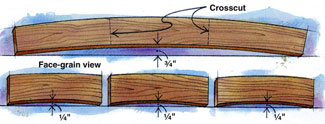
3. Next, read the grain of the board to determine
which end to feed first so the grain runs "downhill" and away from the
cutter head, as shown below. This helps reduce grain tearout.
Now, decrease the cutting depth to 1/32", and
make a final pass along the entire edge of the board. If the grain runs every
which way, slow down your feet rate to reduce tearout to a minimum.
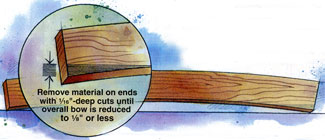
4. For boards too long for the method described in Step 2, or for short boards
bowed 1/2" or more, try this technique. With a straightedge or chalk line,
mark a line as shown at right. Then, cut along this line with a portable
circular saw or jigsaw. If you closely follow the line you should be able to
joint the edge straight and smooth in one pass, as described in Step 3.
5. Because of the position of defects in a board, you may find it necessary to
straighten its convex edge. This could happen when the best wood in a board is
along its convex edge, as shown below. Then, it often makes sense to
straighten that edge first so you can join the good edge to other work pieces or
rip thin strips from the best wood and work toward the lesser-quality wood.
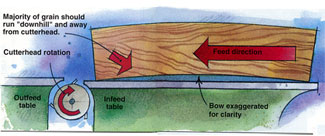
Do not attempt to straighten a convex edge on a jointer, even if the convex edge
is bowed by less than 1/2". To straighten any convex edge, follow the
method described in Step 4.

More joining pointers to keep in mind
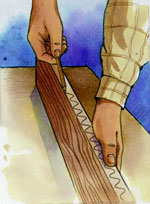
The grain of highly figured woods, such as
bird's-eye maple, can tear out quite easily, especially if your jointer knives
aren't as sharp as they should be. At these times, slow down your feed rate to a
crawl (just an inch or two per second) and take light cuts (1/32" or less).
It may be difficult to tell if you're getting a
complete cut at these shallow depths, so try this trick. Mark a wavy pencil line
along the entire edge, as shown right, and make the cut. Any remaining
pencil marks tell you that you need to repeat the cut.
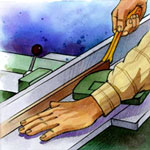 Here's
a good rule of thumb that may actually save your thumb. Whenever you
edge-joint a board that is not as wide as your jointer's fence is high, use a
push stick, as shown at right.
Here's
a good rule of thumb that may actually save your thumb. Whenever you
edge-joint a board that is not as wide as your jointer's fence is high, use a
push stick, as shown at right.
Remember to reposition your jointer's fence across
the width of the tables from time to time. You'll get more life from your knives
because they will wear more evenly along their lengths.
Written by:
Bill Krier with Jan Svec
Illustrations:
Brian Jensen
Wood
On-Line
The Club will be selling tickets for two
raffles to be held at the Club picnic on May 21 at Falls Mill.
Items to be raffled are the Delta Dust Collector donated by the
Delta development team that did the program in February and a Jet
Mini Lathe donated by General Industrial Supply. Tickets will be
on sale at the Club meetings in March, April, and May and again at
the picnic itself. Consider this as a donation to the Club with a
chance to win a great prize.
Tickets will be available for $3 each or
2 for $5 to Club members and guests. There will be two boxes. One
for white tickets and another for red. Purchasers are to write
their names on the back of the ticket half to be put into the
appropriate box. You do not need to be present to win.
Funds from the raffles will be put into
the Club treasury and earmarked for purchase of audio/video
equipment and support of Club celebration events.
Larry Bowers will be selling the tickets.
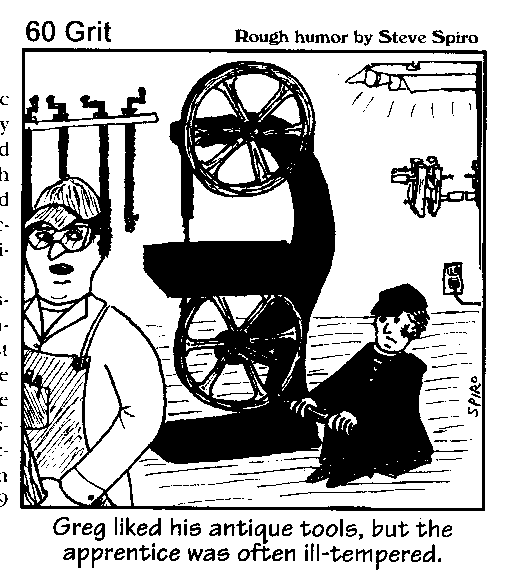
THIS MONTH
The program this month will be presented by Mr. Wayne Souter, from the Woodline
USA company located in LaVergne, TN. He will be showing and
demonstrating his precision dovetail joinery system
See you on the 15th.
click on the image to go to these sites
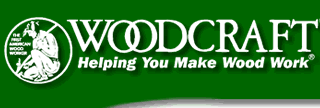
 Vol. 20/ Issue 3
March 2005
Editor: Tom Gillard Jr.
Vol. 20/ Issue 3
March 2005
Editor: Tom Gillard Jr. 
![]()
![]()
![]()
![]()






 Here's
a good rule of thumb that may actually save your thumb. Whenever you
edge-joint a board that is not as wide as your jointer's fence is high, use a
push stick, as shown at right.
Here's
a good rule of thumb that may actually save your thumb. Whenever you
edge-joint a board that is not as wide as your jointer's fence is high, use a
push stick, as shown at right.
